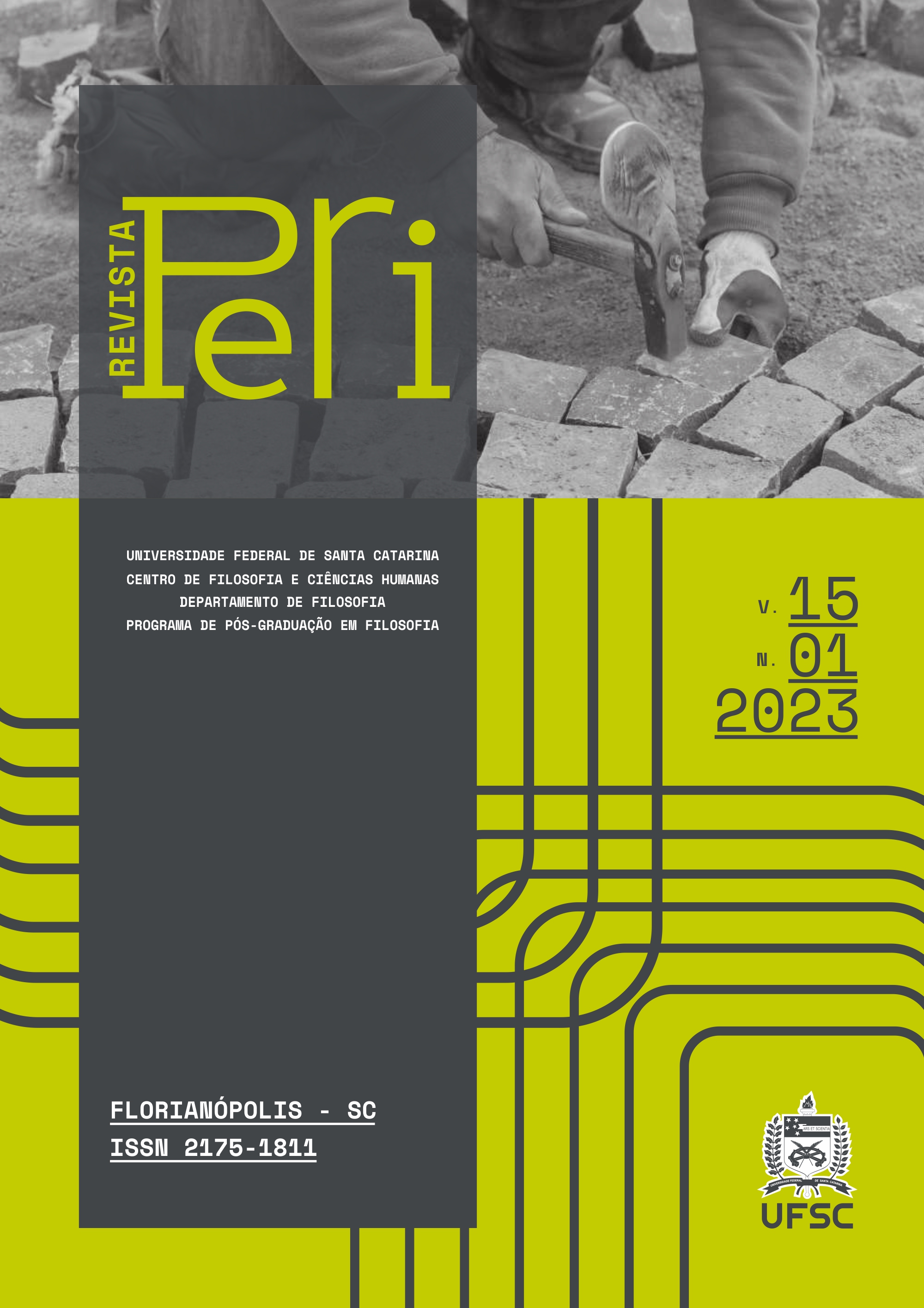Epistemologias da ignorância e ignorância sistematicamente construída
Palavras-chave:
Epistemologias da ignorância, Injustiça epistêmica, Ignorância sistematicamente construída, Ignorância motivada, Epistemologia socialResumo
O objetivo deste trabalho é argumentar a favor de uma distinção entre casos onde a ignorância é tomada como mera ausência de um bem epistêmico, como conhecimento ou crença verdadeira, e casos que não podem ser descritos a partir, apenas, da ausência desses bens. Para realizar este objetivo, o artigo será dividido em três seções. Na primeira seção apresento as duas principais definições de ignorância defendidas hoje na literatura contemporânea das epistemologias da ignorância, a saber, ignorância como ausência de conhecimento e ignorância como ausência de crença verdadeira. Na segunda seção, irei apresentar duas concepções de ignorância que são sistematicamente construídas, a saber, ignorância resultante de casos de injustiça hermenêutica e ignorância branca. Por fim, será sugerido, na terceira seção, que interpretar ignorância apenas como mera ausência de um bem epistêmico não é suficiente para a compreensão do conceito, visto que há casos onde a ignorância não é meramente acidental, mas sim, causalmente conectada com processos de produção de não conhecimento.
Referências
BISPO, Lucas Jairo Cervantes. Sobre a natureza da ignorância. Intuitio, [S.L.], v. 14, n. 2, p. 1-16, 31 dez. 2021. EDIPUCRS. http://dx.doi.org/10.15448/1983-4012.2021.2.40050.
DENICOLA, Daniel. Understanding ignorance: the surprising impact of what we don’t know. Cambridge: The MIT Press, 2017.
FELDMAN, Richard. Epistemology. New Jersey: Prentice Hall, 2002.
FRICKER, Miranda. Epistemic injustice and the preservation of ignorance. In: PEELS, Rik; BLAAUW, Martijn. The epistemic dimensions of ignorance. New York: Cambridge University Press, 2016, p. 160-177.
________________. Epistemic Injustice: Power and the Ethics of Knowing. New York: Oxford Press, 2007.
GETTIER, Edmund. Is justified true belief knowledge? Analysis, 23, p. 121-123, 1963.
GOLDMAN, A; OLSSON, E. Reliabilism and the Value of Knowledge. In: PRITCHARD, Duncan; MILLAR, Alan; HADDOCK, Adrian. Epistemic Value. Oxford: Oxford University Press, 2009, p. 19-40.
GOLDMAN, Alvin; O’CONNOR, Cailin, "Social Epistemology". In: ZALTA, Edward N. (Ed.). The Stanford Encyclopedia of Philosophy, 2021. URL= <https://plato.stanford.edu/archives/win2021/entries/epistemology-social/>.
MAITRA, Ishani. The nature of Epistemic Injustice. Philosophical Books, v. 51. n. 4. 2010.
MEDINA, José. The Epistemology of Resistance: gender and racial oppression, epistemic injustice and resistant imaginations. New York: Oxford University Press, 2013.
_____________ Ignorance and racial sensitivity. In: PEELS, Rik; BLAAUW, Martijn. The epistemic dimensions of ignorance. New York: Cambridge University Press, 2016, p. 178-201.
MILLS, Charles. Global white ignorance. In: GROSS, Mathias; MCGOEY, Linsey. Routledge international handbook of ignorance studies. Oxon; New York: Routledge, 2015., p. 217-227.
_____________. White Ignorance. In: SULLIVAN, S; TUANA, N. Race and Epistemologies of Ignorance. New York: Suny Press, 2007, p. 11-38.
MORVAN, Pierre Le. On Ignorance: a reply to peels. Philosophia, [S.L.], v. 39, n. 2, p. 335-344, 8 dez. 2010.
________________. Knowledge, Ignorance and True Belief. Theoria, [S.L.], v. 77, n. 1, p. 32-41, 17 jan. 2011a.
________________. On Ignorance: a vindication of the standard view. Philosophia, [S.L.], v. 40, n. 2, p. 379-393, 4 out. 2011b.
________________. Why the Standard View of Ignorance Prevails. Philosophia, [S.L.], v. 41, n. 1, p. 239-256, 30 jan. 2013.
________________. When ignorance excuses. Ratio, [S.L.], v. 32, n. 1, p. 22-31, 22 ago. 2018.
ORESKES, Naomi; CONWAY, Erik M.. Merchants of doubt: how a handful of scientists obscured the truth on issues from tobacco smoke to global warming. New York: Blomsbury Press, 2010.
PEELS, Rik. What is Ignorance? Philosophia, v. 38., n.1. p. 57–67, 2010.
__________. Ignorance Is Lack of True Belief: A Rejoinder to Le Morvan. Philosophia, v. 39. no 2. p. 344–355. 2011a.
__________. Tracing Culpable Ignorance. Logos & Episteme, [S.L.], v. 2, n. 4, p. 575-582, 2011b.
__________. The New View on Ignorance Undefeated. Philosophia, v. 40. n.4, p. 741–750, 2012.
__________. What Kind of Ignorance Excuses? Two Neglected Issues. The Philosophical Quarterly, [S.L.], v. 64, n. 256, p. 478-496, 2014.
PEELS, Rik; BLAAUW, Martijn. The epistemic dimensions of ignorance. New York: Cambridge University Press, 2016.
PEELS, Rik; MORVAN, Pierre Le. The Nature of Ignorance: Two Views. In: PEELS, Rik; BLAAUW, Martijn. The epistemic dimensions of ignorance. New York: Cambridge University Press, 2016, p. 12-32.
POHLHAUS, Gaile. Relational Knowing and Epistemic Injustice: toward a theory of willful hermeneutical ignorance. Hypatia, [S.L.], v. 27, n. 4, p. 715-735, 2012. DOI: http://dx.doi.org/10.1111/j.1527-2001.2011.01222.x.
SOMIN, Ilya. Is political ignorance rational? In: HANNON, Michael; RIDDER, Jeroen de (Ed.). The Routledge Handbook of Political Epistemology. Abingdon: Routledge, 2021, p. 241-253.
SULLIVAN, Shanon; TUANA, Nancy. Race and Epistemologies of Ignorance. New York: Suny Press, 2007.
WILLIAMSON, Timothy. Knowledge and its Limits. Oxford: Oxford University Press, 2000.
Downloads
Publicado
Edição
Seção
Licença
Copyright (c) 2023 João Marcelo Saraiva

Este trabalho está licenciado sob uma licença Creative Commons Attribution-NonCommercial-ShareAlike 4.0 International License.
1. Autores mantém os direitos autorais e concedem à revista o direito de primeira publicação, com o trabalho simultaneamente licenciado sob a Creative Commons Attribution License que permite o compartilhamento do trabalho com reconhecimento da autoria do trabalho e publicação inicial nesta revista.
2. Autores têm autorização para assumir contratos adicionais separadamente, para distribuição não-exclusiva da versão do trabalho publicada nesta revista (ex.: publicar em repositório institucional ou como capítulo de livro), com reconhecimento de autoria e publicação inicial nesta revista.
3. Autores têm permissão e são estimulados a publicar e distribuir seu trabalho online (ex.: em repositórios institucionais ou na sua página pessoal) a qualquer ponto antes ou durante o processo editorial, já que isso pode gerar alterações produtivas, bem como aumentar o impacto e a citação do trabalho publicado (Veja O Efeito do Acesso Livre).


